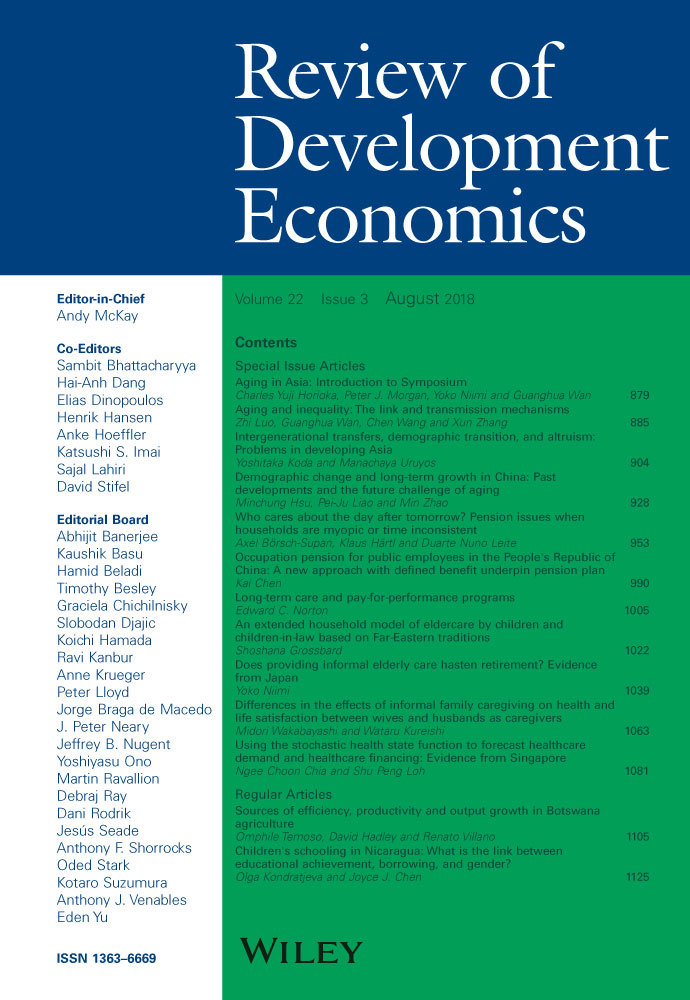The peculiar insertion of Brazil into global value chains
Corresponding Author
Julia Callegari
Universidade de São Paulo (USP), Brazil
Correspondence
Julia Callegari, Universidade de São Paulo (USP), Brazil.
Email: [email protected]
Search for more papers by this authorTatiana Massaroli Melo
Universidade Estadual Paulista (UNESP), São Paulo, Brazil
Search for more papers by this authorCarlos Eduardo Carvalho
Pontifícia Universidade Católica de São Paulo (PUC-SP), Brazil*
Search for more papers by this authorCorresponding Author
Julia Callegari
Universidade de São Paulo (USP), Brazil
Correspondence
Julia Callegari, Universidade de São Paulo (USP), Brazil.
Email: [email protected]
Search for more papers by this authorTatiana Massaroli Melo
Universidade Estadual Paulista (UNESP), São Paulo, Brazil
Search for more papers by this authorCarlos Eduardo Carvalho
Pontifícia Universidade Católica de São Paulo (PUC-SP), Brazil*
Search for more papers by this authorAbstract
Brazil plays a very peculiar role in global value chains (GVC): the country imports high technological goods in general while going through early deindustrialization and relying mainly on basic goods for its exports. Even after developing a broad, diversified industrial framework and becoming one of the countries that has received more foreign direct investments since the 1990s, Brazil has been struggling to occupy a more technologically oriented place in GVCs. This paper examines the conditionings of this pattern of insertion by characterizing the country's quantitative and qualitative model of integration into GVCs and by analyzing the elements that can explain this performance.
REFERENCES
- Arbache, J., & Moreira, R. (2015, May). How can services improve productivity? The case of Brazil. Paper presented at the proceedings of the IV Congress Redlas, Montevideo, Uruguay.
- Arend, M. (2015). The industrialization of Brazil during the new International Division of Labour (Working Paper 2105). Brasilia: IPEA.
- Baumann, R., & Kume, H. (2013). New trade patterns and tariff policy in Brazil. In E. Bacha & M. Bolle (Eds.), The Future of Industry in Brazil. Rio de Janeiro, Brazil: Brazilian Civilization.
- Baldwin, R., & Venables, A. (2013). Spiders and snakes: Offshoring and agglomeration in the global economy. Journal of International Economics, 90(2), 245–254.
- Backer, K., & Miroudot, S. (2013). Mapping global value chains (OECD Trade Policy Papers No. 159). Paris: OECD.
10.1787/5k3v1trgnbr4-en Google Scholar
- Bielschowsky, R., Squeff, G., & Vasconcelos, L. (2015). Evolution of investments in three expansion fronts of the Brazilian economy in the 2000s. Brasilia: IPEA.
- Carneiro, F. (2014). Trade and protectionism in intermediate goods. Brasilia: IPEA.
- Carvalho, L., & Kupfer, D. (2011). Diversification or specialization: an analysis of the structural change process of the Brazilian industry. Brazilian Journal of Political Economy, 31(4), 618–637.
10.1590/S0101-31572011000400007 Google Scholar
- Clark, C. (1957). The conditions of economic progress. London: Macmillan.
- Dosi, G., Grazzi, M., & Moschella, D. (2014). Technology and costs in international competitiveness: From countries and sectors to firms (LEM Working Paper No. 2014/10). Pisa, Italy: Sant'Anna School.
- Gadelha, C. (2001). Industrial Policy: a structural and sistemic neo-schumpeterian view. Brazilian Journal of Political Economy, 21(4), 149–171.
- Gereffi, G. (2014). A global value chain perspective on industrial policy in emerging markets. Duke Journal of Comparative & International Law, 13(3), 433–458.
- Gereffi, G., Humphrey, J., Kaplinsky, R., & Sturgeon, T. J. (2001). Introduction: Globalisation, value chains and development (Working paper). IDS Bulletin, Institute of Development Studies.
- Humphrey, J. (2004). Upgrading in global value chains (Working Paper ILO No. 28). Geneva, Switzerland: Policy Integration Department, World Commission on the Social Dimension of Globalization.
- Koopman, R., Powers, W., Wang, Z., & Wei, S-J. (2010). Give credit to where credit is due: Tracing value added in global production chains (NBER Working Papers Series No. 16426). Cambridge, MA: National Bureau of Economic Research.
10.3386/w16426 Google Scholar
- Kowalski, P., Gonzalez, J., Ragoussis, A., & Ugarte, C. (2015). Participation of developing countries in global value chains: Implications for trade and trade-related policies (OECD Trade Policy Papers, No. 179). Paris: OECD.
10.1787/5js33lfw0xxn-en Google Scholar
- Mazzucato, M. (2015). The entrepreneurial state: Debunking public vs. private sector myths. Bath, U.K.: Anthem.
- Miroudot, S., Rouzet, D., & Spinelli, F. (2013). Trade policy implications of global value chains: Case studies (OECD Trade Policy Paper No. 161). Paris: OECD.
10.1787/5k3tpt2t0zs1-en Google Scholar
- Morceiro, P. (2016). Sectoral demand and competitiveness of the Brazilian manufacturing industry (Working Paper Series No. 2016-12). São Paulo, Brazil: Department of Economics (FEA/USP), University of São Paulo.
- OECD (2013). Interconnected economies: Benefiting from global value chains. Paris: OECD.
10.1787/9789264189560-en Google Scholar
- OECD, WTO, & UNCTAD (2013). Implications of global value chains for trade, investment, development and jobs. G20 Summit, Saint Petersburg, Russia.
- Reiner, C., & Staritz, C. (2013). Private sector development and industrial policy: Why, how and for whom? In Österreichischen Forschungsstiftung für Internationale Entwicklung (ÖFSE) (Eds.), Private sector development: Ein neuer Businessplan für Entwicklung? (A new business plan for development). Vienna: ÖFSE.
- Reinert, E. (2007). How rich countries got rich … and why poor countries stay poor. London: Constable and Robinson.
- Rowthorn, R., & Ramaswamy, R. (1999). Growth, trade, and deindustrialization. IMF Staff Papers, 46(1), 18–41.
- Sachs, D., & Shatz, H. (1994). Trade and jobs in U.S. manufacturing. Brookings Papers on Economic Activity, No. 1, 1–69.
10.2307/2534630 Google Scholar
- Sturgeon, T., Gereffi, G., Guinn, A., & Zylberberg, E. (2013). Brazil in global value chains: Implications for trade and industrial policy. Brazilian Review of International Trade, No. 115, 26–41.
- Thorstensen, V., Ferraz, L., Ramos, D., Müller, C., & Eleoterio, B. (2013). The multiplication of preferential trade agreements and the isolation of Brazil. São Paulo: IEDI.
- UNCTAD (2003). Trade and Development Report - Capital Accumulation, Growth and Structural Change. Report by the secretariat of the United Nations Conference on Trade and Development. Geneva: UNCTAD.
- Veiga, P., & Rios, S. (2015). Insertion into global value chains and public policy: the case of Brazil (Working Paper 2069). Rio de Janeiro: Center for Integration and Development Studies (CINDES).
- Zhang, L., & Schimanski, S. (2014). Global value chains and developing countries. International Political Economy Bulletim, No. 17, 73–92.




